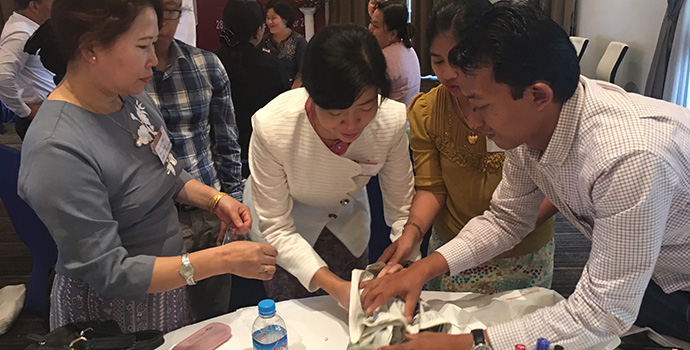- About Us
-
Who we are
-
- Publications
-
- ADPC Academy
-
MediaADPC'S NEWS
ADPC launches training program to address psychosocial needs after emergencies in Myanmar ADPC launches training program to address psychosocial needs after emergencies in Myanmar
28 Nov - 2 Dec 2016
Nay Pyi Taw, Myanmar

Participants work together during a group activity on building community resilience during the Psychological First Aid (PFA) Course in Nay Pyi Taw, Myanmar.The National Mental Health and Psychosocial Support (MHPSS) in Emergencies Training Program kicked off with the Psychological First Aid (PFA) Course which gave participants the skills to address psychosocial needs after emergencies.
During the training participants learned the essentials of providing psychosocial care to the survivors of disaster events to ensure both their physical and mental needs are met.
“This course addressed the demand to look into the mental and psychological wellbeing of at risk populations to better prepare for disasters and lower risk,” said Janette Lauza-Ugsang, Acting Head of the Public Health in Emergencies Department at ADPC. “By doing this, participants can create more comprehensive disaster risk reduction initiatives.”
Ms. Janette Lauza-Ugsang and Dr. Yvonette Duque, Senior Public Health Specialist at ADPC, take part in a daily steering committee meeting with participants and facilitators to gain feedback about the course.The course included 34 participants from relevant government departments, local organizations including the Myanmar branch of Plan International, Pact Global and the Red Cross, Universities, hospitals and other relevant academic institutions.
The training course is part of a larger program that aims to strengthen community safety and resilience through the capacity building of health personnel to manage the mental health and psychosocial impacts of emergency situations. The program also strives to establish a system to ensure mental health and psychosocial support can be provided to survivors immediately after a disaster.
During the course participants created an action plan to guide the continuation of psychosocial training initiatives in their respective institutions. Commitments included learning objectives, target training populations and where the resources to commit to these actions would come from.
“One fundamental aim of this training initiative is to enable partners in the country to continue developing its capacity by holding and/or rolling-out mental health and psychosocial support short courses even when external funding is no longer available,” said Ms. Janette.
A group photo of members of the ADPC team including Ms. Janette Lauza-Ugsang (center) and Dr. U Kyi Minn (third from the left) and Dr. San San Aye (center left), Director General of Department of Social Welfare and other senior officials from Department of Social Welfare – Relief and Resettlement at the closing ceremony.ADPC launched the Mental Health and Psychosocial Support training program in Myanmar with funding support from the Royal Government of Norway. The program followed a successfully implemented pilot-program in Vietnam and Bangladesh from 2011–2015. The program created groups of master trainers in these countries who continue to hold local level training courses and have added related knowledge from the program to University level courses.
Dr. San San Aye, Directory General, Department of Social Welfare in Myanmar was present for both the opening and closing of the course. She stressed the importance of continued focus on mental health and psychosocial support after a disaster during her closing remarks.
“Natural disasters and complex emergencies can have significant effects on mental health and psychological aspects of the disaster affected communities, therefore stronger coordination, increased accountability and strategic positioning of humanitarian organizations are critical to lower risks, decrease vulnerabilities and improve preparedness in our communities,” said Dr. San San Aye.
ADPC and the Department of Social Welfare of the Ministry of Social Welfare, Relief and Resettlement (MSWRR) Myanmar organized the course. It is only the first of many courses with more planned for the future that will help address mental health and psychosocial needs after emergencies.
Participants and facilitators pause to take a group photo during the training course.Latest NewsRelated Trainings
-